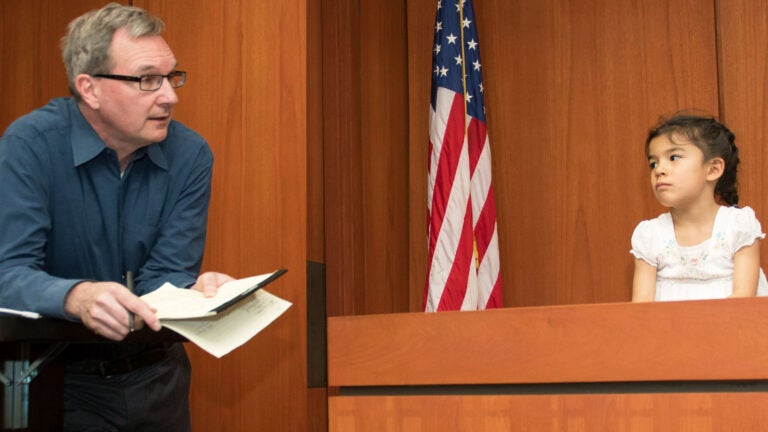
Thomas Lyon questions a 4-year-old child who volunteered in a mock interview training session with USC Gould School of Law students. (Photo/Brett Van Ort)
???? Law, psychology expert helps the littlest witnesses have their day in court
For 20 years, Thomas Lyon has been studying how to best interview child witnesses; now he’s making a difference in their court cases, too
[iframe width=”100%” height=”166″ scrolling=”no” frameborder=”no” allow=”autoplay” src=”https://w.soundcloud.com/player/?url=https%3A//api.soundcloud.com/tracks/455266578%3Fsecret_token%3Ds-643Ve&color=%23ff5500&auto_play=false&hide_related=false&show_comments=true&show_user=true&show_reposts=false&show_teaser=true”]
For 20 years, Thomas Lyon has studied how to best interview child witnesses — perhaps a 4- or 5-year-old taking the stand as the sole witness to a murder or sexual abuse.
“When you look at what happens when kids get into court, it’s mostly yes/no questions,” said Lyon, a professor of law and psychology at the USC Gould School of Law. “And actually if you look at how adults talk to each other, it’s mostly yes/no questions. But the difference is when adults ask yes/no questions, they elaborate on their answers.”
Not surprisingly, Lyon avoids yes/no questions, and instead teaches a method of establishing rules or instructions, building rapport and asking the most open-ended questions as possible.
These are things he’s practiced in his research at L.A.’s Juvenile Dependency Court for children who have been removed from their homes due to abuse or neglect. There, he focused on interview technique and avoided asking kids about their actual cases, so as not to interfere. He did forensic interviews for court when the Los Angeles District Attorney’s Office called him in.
Helping child witnesses have their say
Now, thanks to a five-year grant from the National Institutes of Health, Lyon and his lab will get to do forensic interviews with kids — testimony that can be used in court.
Focusing on sex abuse, his team will flag cases involving kids ages 7 to 10 years old and, once Lyon gets court approval, he will perform the forensic interviews that are then recorded and delivered to the courts.
We’re focused on sex abuse because those are the cases where the child’s testimony is the most important.
Thomas Lyon
“We’re focused on sex abuse because those are the cases where the child’s testimony is the most important,” he said.
These are also cases that sometimes fall apart because the child recants. They’ll second-guess themselves. They’ll see the downsides to disclosing.
“They’ll find out their mother isn’t happy about it,” he said. “They have the abuser, who is typically a stepfather or father, who is supporting the family … and he’ll be vehemently denying that he abused them.”
He remembers one recent case. A 9-year-old girl came in alleging abuse but later changed her story, calling it a dream. But when Lyon’s team pressed her on the dream and what happened in it, the details were consistent with the reported abuse.
“That’s the kind of experience that we’re having which convinces me that we can do a lot of good in cases where the child doesn’t already have a child advocacy center or good forensic interview at the time they get to court,” he said.



